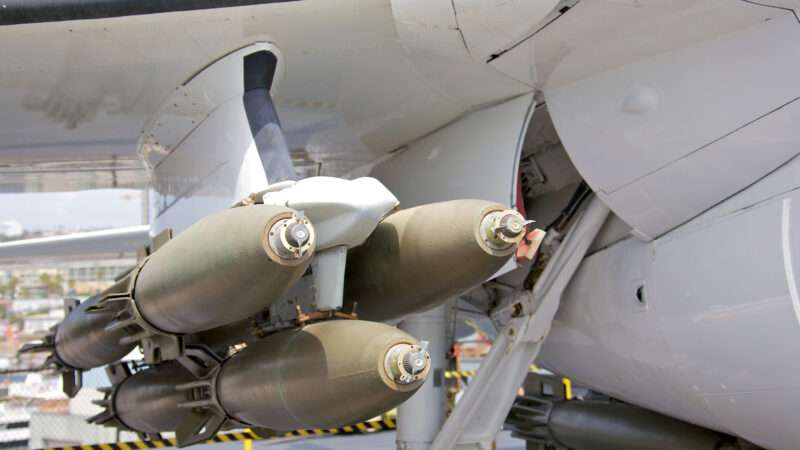
President Joe Biden's decision to include cluster bombs in his latest shipment of arms to Ukraine is creating rare public fissures in the otherwise rock-solid liberal consensus in favor of continued military aid to the embattled country.
Critics' argument against providing these munitions on the grounds that they will cause death and injury long after the war is over could easily be applied to most forms of military aid the U.S. is sending over there.
Defense officials announced the transfer of cluster bombs—which spread smaller bomblets when dropped—on Friday. Those bomblets often don't explode immediately, seeding areas with deadly explosives that continue to injure and kill people for years after a conflict ends.
The delayed damage from these bombs is why most countries (although not Ukraine, Russia, or the U.S.) have signed onto a treaty banning their use. U.S. law generally forbids their transfer, although the president can waive those restrictions. In a CNN interview, Biden said he made a "very difficult decision."
The president's reticence, and Ukrainian assurances that they'll use the munitions in a responsible manner, haven't mollified progressives nor America's European allies.
At Responsible Statecraft, Daniel Larison documents statements from a number of Democratic lawmakers unequivocally criticizing the transfer. Some 19 representatives signed a letter saying the move will "further endanger Ukrainian civilians" and undermines America's moral leadership.
"Experts warn that the likelihood of leaving behind dangerous unexploded material is dependent on several factors and potentially much higher than the Pentagon has estimated. The reality is that there is no such thing as a safe cluster bomb," they wrote. Reps. Sara Jacobs (D–Calif.) and Ilhan Omar (D–Minn.) have also introduced an amendment to this year's defense authorization bill to stop the transfer.
This level of public criticism is unusual given that even anti-war, progressive Democrats have generally been in lockstep behind the Biden administration's Ukraine policy. Contrast progressives' reaction to cluster bomb transfers to the debacle last year when the House Progressive Caucus issued a letter urging direct negotiations between the U.S. and Russian governments about ending the war in Ukraine only to retract it a day later.
It's a peculiarity of American foreign policy that so discourse and policy itself revolves around the types of weapons being used in a given conflict.
In both the Obama and Trump administrations, the U.S.' standard for attacking the Syrian government was whether it used chemical weapons—an odd "red line" that never made much sense given its liberal use of conventional weapons to kill and maim people.
The flashpoint over cluster bombs makes a little more sense at first brush—given the long, deadly second-life these weapons can have. But these aren't the only type of military hardware that can continue to claim life and limb after the official war ends.
Recall all the videos that circulated on the internet during the final chaotic hours of the U.S. evacuation from Afghanistan showing Taliban fighters driving around in American-made vehicles and toting American-made weapons.
All that hardware might not explode and kill people on its own like cluster bombs. Its capture is still a huge windfall for the new Taliban government, which can now use it in its plans for domestic score-settling and oppression.
Similar risks abound in Ukraine. The sheer number of weapons and war materials we've sent to the country heightens the risk that a significant portion of that aid will be diverted to unsavory paramilitary groups and criminal organizations.
A government watchdog report from last month found that U.S. military personnel were failing to adequately account for thousands of pieces of equipment, including small arms shipments, passing through Poland and into Ukraine, reported Task & Purpose.
U.S. diplomatic personnel in Ukraine also said last year that it's often "impractical or impossible" to exercise standard oversight of weapons shipments, given the intensity of the conflict.
Earlier this year, Pentagon officials told Congress they've seen "no evidence" that weapons sent to Ukraine are ending up in unintended hands.
Perhaps that's true. As the war rages on, the Ukrainian government has a huge incentive to get weapons into the hands of frontline soldiers.
It doesn't answer the question of what happens once the war in Ukraine ends, or at least winds down to something resembling the low-intensity conflict that persisted in the country's East prior to the Russian invasion.
A government with long-running corruption issues sitting on a lot of U.S.-supplied weapons it doesn't need as much anymore is a recipe for many of those weapons falling into the wrong hands.
And there are a lot of wrong hands in Ukraine.
To fight that earlier conflict in its East, the Ukrainian government leaned heavily on paramilitary groups, including far-right and neo-Nazi groups.
Early in the war, there was some evidence those same groups were getting Western-supplied weapons. Defense Department officials have dismissed more recent reports of that happening.
Even so, should the current war devolve into a frozen conflict, the odds that all the weapons we've sent over there (and that we currently can't account for) stay in responsible hands and aimed at their intended targets will diminish greatly.
U.S.-supplied cluster bombs will have deadly impacts in Ukraine long after formal hostilities cease between Russia and Ukraine. The same can easily be said of almost all weapons sent to the country.
The same reasons to oppose sending cluster bombs to Ukraine are the same reasons to oppose sending weapons to the country generally.
The post Cluster Bombs Aren't the Only Weapons That Kill People After a War Is Over appeared first on Reason.com.







